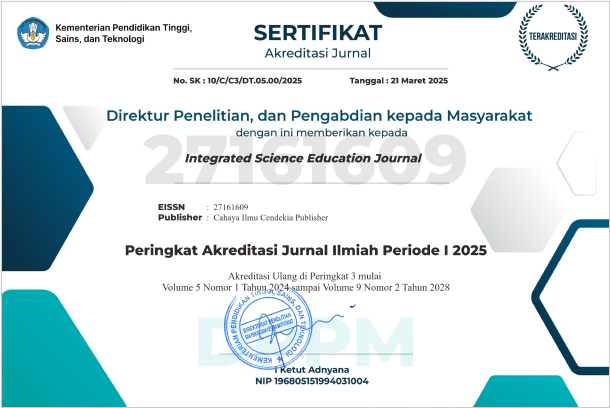Explicit Instruction Based E-Module Development on Momentum and Impulsive Material
Abstract
Purpose of study: Aims to determine product development procedures and test product validity so that it meets eligibility as teaching materials.
Methodology: The research procedure is carried out through the steps of developing a 4-D model, namely define, design, development, and disperse using a descriptive method. This study uses a 4-D development model and is limited to the development stage (develop).
Main Findings: The results of this study indicate that the media and material expert validator stated that the electronic module based on explicit learning on momentum and impulse material had a very good proportion of 90%, so that it was declared feasible and as many as 88.67% of students were interested in learning to use the electronic module. This shows that the electronic module based on explicit learning on momentum and impulse material is very good and feasible to be used as a physics teaching material in class XI in Senior high school.
Novelty/Originality of this study: The latest in this research is the basis used. Because this research is based on explicit instructions that have never been done by previous research.
References
A. D. Siregar and L. K. Harahap, “Pengembangan E-Modul Berbasis Project Based Learning Terintegrasi Media Komputasi Hyperchem Pada Materi Bentuk Molekul [Development of Project Based Learning Integrated E-Module Hyperchem Computing Media on Molecular Shape Material],” JPPS (Jurnal Penelit. Pendidik. Sains), vol. 10, no. 1, p. 1925, 2020, doi: 10.26740/jpps.v10n1.p1925-1931.
V. Sholeha, S. Wahyuningsih, R. Hafidah, and M. M. Syamsuddin, “Penerapan Literasi Sains Basis Kelas oleh Guru PAUD di Kota Surakarta [Application of Class-Based Science Literacy by PAUD Teachers in Surakarta City],” Jurnal Obsesi: Jurnal Pendidikan Anak Usia Dini, vol. 6, no. 3, pp. 2013–2019, 2022, doi: 10.31004/obsesi.v6i3.1237.
N. Fauziah, A. Hakim, and Y. Handayani, “Meningkatkan Literasi Sains Peserta Didik Melalui Pembelajaran Berbasis Masalah Berorientasi Green Chemistry Pada Materi Laju Reaksi [Improving Students' Scientific Literacy Through Green Chemistry Oriented Problem-Based Learning on Reaction Rate Material],” J. Pijar Mipa, vol. 14, no. 2, pp. 31–35, 2019, doi: 10.29303/jpm.v14i2.1203.
A. H. Lubis, “ICT Integration In 21st-Entury Indonesian English Language Teaching: Myths and Realities,” Cakrawala Pendidikan., pp. 11–21, 2018.
M. Wulandari, A. Astalini, and D. Darmaji, “Analisis Kebutuhan Mahasiswa terhadap Pengembangan E-Modul Fisika Matematika I di Program Studi Pendidikan Fisika FKIP Universitas Jambi [Analysis of Student Needs for the Development of Mathematical Physics E-Module I in the Physics Education Study Program, FKIP University of Jambi],” J. Pendidik. MIPA, vol. 11, no. Desember 2021, pp. 23–28, 2021.
A. Maulana, G. T. Sekartaji, R. Arthur, and L. K. Dewi, “Pengembangan Media Video Presentasi Pada Mata Kuliah Hidrologi Di Universitas Negeri Jakarta [Development of Presentation Video Media in the Hydrology Course at Jakarta State University],” Kwangsan J. Teknol. Pendidik., vol. 7, no. 2, p. 170, 2019, doi: 10.31800/jtp.kw.v7n2.p170--183.
H. Saputra, Nofriadi, A. Prijuna, and B. Efendi, “Internet Sehat dan Aman Di Era Pandemik Bagi Masyarakat,” J. Pemberdaya. Sos. dan Teknol. Masy, vol. 1, no. 1, pp. 85–88, 2021.
M. Dewati, Y. B. Bhakti, and I. A. D. Astuti, “Peranan Microscope Smartphone sebagai media pembelajaran Fisika berbasis STEM untuk meningkatkan pemahaman konsep Optik [The role of the Smartphone Microscope as a STEM-based Physics learning medium to increase understanding of the concept of Optics],” Pros. SNFA (Seminar Nas. Fis. dan Apl, vol. 4, p. 36, 2019, doi: 10.20961/prosidingsnfa.v4i0.35910.
F. Anggriani, B. Karyadi, and A. Ruyani, “Kemampuan Berpikir Kritis Siswa Melalui Pembelajaran Berbasis Lingkungan untuk Studi Ekosistem Sungai [Students' Critical Thinking Ability Through Environment-Based Learning for River Ecosystem Studies],” PENDIPA J. Sci. Educ, vol. 3, no. 2, pp. 100–105, 2019, doi: 10.33369/pendipa.v3i2.7701.
A. Fauziah et al., “Pengaruh Pembelajaran ICT dan Minat Belajar terhadap Kesiapan Membaca Anak Usia Dini [The Influence of ICT Learning and Learning Interest on Early Childhood Reading Readiness],” EduFisika, vol. 4, no. 2, pp. 61–69, 2017, doi: https://doi.org/10.22437/edufisika.v2i01.4043.
A. Permata and Y. B. Bhakti, “Keefektifan Virtual Class dengan Google Classroom dalam Pembelajaran Fisika Dimasa Pandemi Covid-19 [The Effectiveness of Virtual Class with Google Classroom in Physics Learning During the Covid-19 Pandemic],” JIPFRI (Jurnal Inov. Pendidik. Fis. dan Ris. Ilmiah), vol. 4, no. 1, pp. 27–33, 2020, doi: 10.30599/jipfri.v4i1.669.
R. Fitriani et al., “Analisis Karakter Kerja Keras Siswa Kelas XI IPA Di SMAN 1 Kota Jambi [Analysis of the Hard Work Character of Class XI Science Students at SMAN 1 Jambi City],” PENDIPA J. Sci. Educ, vol. 5, no. 2, pp. 188–194, 2021, doi: 10.33369/pendipa.5.2.188-194.
M. A. abdur Rohman, “Pendidikan Karakter di Sekolah Menengah Pertama (SMP): Teori, Metodologi dan Implementasi [Character Education in Junior High Schools (SMP): Theory, Methodology and Implementation],” Qalamuna J. Pendidikan, Sos. dan Agama, vol. 11, no. 2, pp. 125–146, 2019.
P. M. Nikita, A. D. Leksmono, and A. Harijanto, “Pengembangan e-modul materi fluida dinamis untuk meningkatkan kemampuan berpikir kritis siswa sma kelas xi [Development of fluid dynamic material e-module to improve critical thinking skills of class xi high school students],” J. Pembelajaran Fis., vol. 7, no. 2, p. 175, 2018.
D. P. Pranata, A. Frima, and A. S. Egok, “Pengembangan LKS Matematika Berbasis Problem Based Learning pada Materi Bangun Datar Sekolah Dasar [Development of Problem-Based Learning Mathematical Worksheets on Elementary School Plane Materials],” J. Basicedu, vol. 5, no. 4, pp. 2284–2301, 2021.
N. S. Herawati and A. Muhtadi, “Developing Interactive Chemistry E-Modul For The Second Grade Students of Senior High School,” J. Inov. Teknol. Pendidik., vol. 5, no. 2, pp. 180–191, 2018.
C. Choirudin, E. F. Ningsih, M. S. Anwar, I. R. Sari, and S. Amalia, “Pengembangan Perangkat Pembelajaran Etnomatematika Pada Situs Purbakala Pugung Raharjo [Development of Ethnomathematics Learning Devices at the Pugung Raharjo Archaeological Site],” Pi Math. Educ. J, vol. 3, no. 1, pp. 18–27, 2020, doi: 10.21067/pmej.v3i1.3755.
M. A. Ramadhan, S. S. Handoyo, and M. M. Alfarisi, “Pengembangan E-Modul Fisika Dasar untuk Mahasiswa Calon Guru SMK Teknik Konstruksi dan Properti [Development of Basic Physics E-Module for Prospective Teacher Students in Construction and Property Engineering Vocational Schools],” J. Pendidik. Fis. dan Teknol, vol. 6, no. 2, p. 238, 2020, doi: 10.29303/jpft.v6i2.2108.
D. H. Marisda and Y. Handayani, “Model Pembelajaran Kolaboratif Berbasis Tugas Sebagai Alternatif Pembelajaran Fisika Matematika [Task-Based Collaborative Learning Model as an Alternative to Mathematical Physics Learning],” Pros. Semin. Nas. Fis, vol. 2, pp. 9–12, 2020.
A. Fitriani, S. Prayogi, and S. Hidayat, “Pengaruh Model Pembelajaran Predict, Observe, Explain, Write (Poew) Terhadap Pemahaman Konsep Fisika Ditinjau Dari Jenis Kelamin Kelas Xi Ipa Sma Negeri 1 Empang [The Influence of the Predict, Observe, Explain, Write (Poew) Learning Model on the Understanding of Physics Concepts in View of Gender Xi Ipa Class SMA Negeri 1 Empang],” Lensa J. Kependidikan Fis, vol. 3, no. 1, p. 227, 2015, doi: 10.33394/j-lkf.v3i1.335.
R. A. Annauval and M. A. Ghofur, “Lingkungan Keluarga Dan Motivasi Belajar Terhadap Hasil Belajar Mata Pelajaran Ekonomi Pada Pembelajaran Daring [Family Environment and Learning Motivation on Learning Outcomes in Economics Subjects in Online Learning],” Edukatif J. Ilmu Pendidik, vol. 3, no. 5, pp. 2114–2122, 2021.
B. Rubini, H. Suhartoyo, and A. Permanasari, “Apakah inkuiri ilmiah berbasis investigasi kelompok dapat meningkatkan kerja ilmiah dan literasi sains siswa ? [Can scientific inquiry based on group investigations improve scientific work and scientific literacy of students?],” J. Inov. Pendidik. IPA, vol. 4, no. 2, pp. 149–157, 2018.
I. Nur, C. Mukti, and H. Nurcahyo, “Developing Computer- Based Biology Learning Media to Improve the Students ’ Learning Outcom,” J. Inov. Pendidik. IPA, vol. 3, no. 2, pp. 137–149, 2017.
L. N. Aulia, S. Susilo, and B. Subali, “Upaya peningkatan kemandirian belajar siswa dengan model problem-based learning berbantuan media Edmodo [Efforts to increase student learning independence with the problem-based learning model assisted by Edmodo media],” J. Inov. Pendidik. IPA, vol. 5, no. 1, pp. 69–78, 2019, doi: 10.21831/jipi.v5i1.18707.
F. A. Febrianti, “Pengembangan Digital Book Berbasis Flip PDF Professional untuk Meningkatkan Kemampuan Literasi Sains Siswa [Development of a Flip PDF Professional-Based Digital Book to Improve Students' Science Literacy Skills],” J. Ilm. Pendidik. Dasar, vol. 4, no. 2, pp. 102–115, 2021, [Online]. Available: http://dx.doi.org/10.33603/.v4i2.5354.
A. Dwianto, I. Wilujeng, Z. K. Prasetyo, and I. G. P. Suryadarma, “The development of science domain based learning tool which is integrated with local wisdom to improve science process skill and scientific attitude,” J. Pendidik. IPA Indones., vol. 6, no. 1, pp. 23–31, 2017, doi: 10.15294/jpii.v6i1.7205.
I. Solikin and R. Amalia, “Materi Digital Berbasis Web Mobile Menggunakan Model 4D [Mobile Web-Based Digital Materials Using 4D Models],” Sistemasi, vol. 8, no. 3, p. 321, 2019, doi: 10.32520/stmsi.v8i3.461.
A. Harso and J. Merdja, “Motivasi Belajar dan Prestasi Belajar Fisika Ditinjau dari Jenis Kelamin [Learning Motivation and Physics Study Achievement in terms of Gender],” Sci. Phys. Educ. J, vol. 3, no. 1, pp. 11–20, 2019, doi: 10.31539/spej.v3i1.991.
A. Ramdani, A. W. Jufri, J. Jamaluddin, and D. Setiadi, “Kemampuan Berpikir Kritis dan Penguasaan Konsep Dasar IPA Peserta Didik [Students' Critical Thinking Ability and Mastery of Basic Science Concepts],” J. Penelit. Pendidik. IPA, vol. 6, no. 1, p. 119, 2020, doi: 10.29303/jppipa.v6i1.388.
I. K. Darmayasa, N. Jampel, A. H. Simamora, and J. T. Pendidikan, “Pengembangan E-Modul Ipa Berorientasi Pendidikan Karakter Di Smp Negeri 1 Singaraja [Character Education Oriented Science E-Module Development at Singaraja 1 Public Middle School],” J. Jur. Teknol. Pendidik, vol. 6, no. 1, pp. 53–65, 2018.
Copyright (c) 2023 Dina Marhami Yusra, Yulita Dwi Citra, Rosnita Rosnita

This work is licensed under a Creative Commons Attribution-NonCommercial 4.0 International License.
Authors who publish with this journal agree to the following terms:
- Authors retain copyright and acknowledge that the Integrated Science Education Journal is the first publisher licensed under a Creative Commons Attribution 4.0 International License.
- Authors are able to enter into separate, additional contractual arrangements for the non-exclusive distribution of the journal's published version of the work (e.g., post it to an institutional repository or publish it in a book), with an acknowledgment of its initial publication in this journal.
- Authors are permitted and encouraged to post their work online (e.g., in institutional repositories or on their website) prior to and during the submission process, as it can lead to productive exchanges and earlier and greater citation of published work.







.png)
.png)






